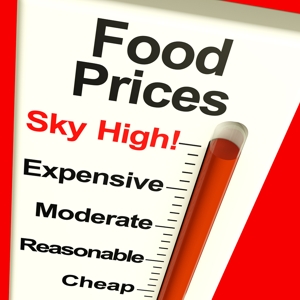Food prices continued to rise through this past September with all products still vectoring sharply upward. The overall increase was the fastest in the past 41 years. And economists say many Canadians’ health is now seriously threatened…
 The elderly and others on fixed incomes are among those
The elderly and others on fixed incomes are among those
hardest hit by the growing reality of food insecurity…
We’ve been hearing, from governments at all levels, food support charities and economists, that Canada is facing one its most serious food and well being crises since the Great Depression. Now, we’re told – albeit by neutral watchdogs – that the threats have become grim realities.
Latest surveys of Canadian grocery shoppers reveal that significant numbers of fixed-income and low-income families are in real trouble. They’ve had to skip meals, buy less food and cut their accustomed quality standards to make ends meet.
A few days ago, we posted a digest of the findings of the latest food price report from the University of Saskatchewan. The USask reports tend to focus more on the consequences of food price increases than on the basic numbers. You might look upon the USask report we posted about a week ago as a preamble to the situation report we’re digesting today.
In a nutshell…
The CBC, in its meticulous, long-form way, runs down a list of the central issues facing Canadian food shoppers in a recent online overview:
Rising food prices are putting a growing number of Canadians under financial strain.
It’s now costing more then $1,000 per month to properly feed a family of 4 in Canada, up from about $900 a year ago.
More and more Canadians are facing the tough choice of paying more for proper, healthy foods, or paying their other household bills.
But there could also be some major impacts on our health — as more Canadians opt for unhealthy food, or skip meals altogether due to rising costs.
This one should be obvious, but I guess, to some, it’s not. But some folks at the bottom of the social and health ladders are already doing very poorly, and stand to lose more ground. That means their increased health care needs will be costing us all more.
Research shows food insecurity is tied to far worse health outcomes, and that could lead to added pressure on our already overburdened healthcare system.
“In adults, we’re talking about type two diabetes, heart disease, high blood pressure, poor bone health – all the reasons why a healthy diet is important,” Prof. Valerie Tarasuk, at the University of Toronto told CBC. But that’s just the start of it: “People who are food insecure are way more likely to turn up in an emergency department, they’re more likely to be hospitalized for a variety of conditions, and once hospitalized, they’re more likely to stay longer, and they’re more likely to be readmitted.”
On the other hand…
As a mere sidelight, the CBC report notes: “Canada’s top three grocers all posted higher profits this year compared with their average performances over the last five years.” The problem is, the grocery chains are not providing a lot of transparency on the issue, as a report from the Dalhousie University Food Analytics Lab points out. It’s kind of depressing that what the Dalhousie people are calling ‘Greedflation’ is emerging as a significant factor in Canada’s growing food instability crisis.
Meanwhile, the Competition Bureau of Canada is preparing to launch a study on competition in the grocery industry.
What do we do about it?
At the same time, the food bank system is failing miserably to meet hungry Canadians’ needs. Other community food support charities are already preparing to fold under the stress of reduced contributions and rocketing demand.
It’s looking more and more like one of those issues that any one of us, individually, can’t do anything material to resolve. And the rest of us can’t be too far behind. At least one observer says it may become necessary to accept that our standard of living (at the of the lowest Canadians on the economic ladder) is plummeting…
~ Maggie J.

